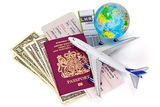Travel Security Risks

There are certain travel security measures you can and must take during domestic or international, and long or short trips to ensure any personal information in your possession remains secured and safe in order to prevent identity theft. Although, increased travel requirements, travel documents and security travel checks at the airports and other sensitive public areas have made it less convenient for us to travel, we still tend to travel more than ever. Especially, international business travel has increased drastically since people of the world are more than ever connected to each other both economically and culturally and current trends point to continued path to globalization. Increased security checks, stringent homeland security travel documents and requirements such as required passports for entry into countries that did not require passports in the past, competitive business environment where businesses continue to look for new markets and additional sources of revenue, and globalization of talent, resources and markets, all lead to higher risks of identity theft and information loss. As the environment around us changes, we need to keep up with those changes in order to better protect ourselves against identity theft and other travel related incidents. One of the constant changes in our life is the legal environment. Although, I do not believe that as a society we are where we need to be when it comes to the legal fight against identity theft, I believe we are making progress; we are aware of the identity theft problem, we have acknowledged the problem, and continue to create laws that will give us, the consumers, the tools to fight identity theft. Such laws are created piece by piece, addressing only certain aspects of identity theft, and are implemented state by state and country by country. Consumers must be aware of the legal changes in their unique environments in order to claim their rights and understand the obligations of those whom they entrust their personal information with. Another problem area impacting identity theft is terrorism. Yes, terrorism. I strongly believe that future terrorism acts will heavily rely on identity theft of innocent people. Of course past terrorism acts have relied on identity theft to plan and execute their acts, however, as governments of the world continue to fight terrorism by cutting the terrorist organizations’ financial sources, terrorists have no other choice but to rely on innocent people’s identity to fund their terrorism acts, unless of course, they plan to give up terrorism and get a better job. As you consider these big changes in our environment and how they affect your personal information and identity theft, you need to make sure you also consider the following global travel security information, tips and recommendations as you travel around the world. Consider applying the travel security tips that are most relevant to your particular situation or expand and modify them to suit your specific needs and situations.
Release Car Liability After Sale - It is very important to understand the reasons and the process for a car liability release after the car is sold to avoid any liability for the car and the actions of the buyer after the sale.
Avoid communication about sensitive information in public – the old saying that the walls have ears may be true for all countries, cultures, and locations. Although this is a site dedicated specifically to identity theft protection, I still remember to this date, a travel security and corprate espionage story from past work experience. Read the story.
Car Selling Precautions - when you decide to sell your car, there are certain car selling precautions that you must consider to prevent the buyer from abusing the car while it is still registered under your name.
Keep your car safe in parking lots - When parking your car in a private or public parking space, make sure you apply these parking lot safety tips.
Don’t leave important documents in your car - very often people leave their important documents in the car thinking that the documents are safe. Your documents will be as safe as your car might be. Consider these car security tips.
Never leave your personal documents unsecured in the hotel rooms – this rule specially applies to global travel security where certain passports may be valuable. Learn more about hotel security measures you can take during your next trip.
Don’t place valuable information on computers - unless you secure that computer like you secure your ID card or driver’s license. More often than not, sensitive information is placed on laptops which are carried around to public areas like restaurants, pools and bars without any regard for travel security risks. Individuals and businesses need to understand the identity theft risks associated with taking laptops containing sensitive information with them when they travel and develop policies and procedures to properly address the security of their information. More on computer security in this section.
Carry the minimum – don’t carry all your personal information with you when you travel. Limit yourself to only a few necessary credit cards and documents as you consider travel security and you will limit your identity theft risks.
Take the copies – Carry photocopies instead of the originals when necessary and possible. For example, copies of passports are not acceptable forms of identification; however, copies of birth certificates may be in some cases when presented with other original documents. So, it is not necessary to carry all originals all the time. I usually carry a copy of my marriage certificate when traveling with the family overseas; however, I never take the original ones if I don't have to. Of course, the copies also reveal one’s personal information; however, originals can inflict a much bigger identity theft damage if lost or stolen.
Beware of your surroundings - when using your secret codes to access cash at ATMs, use your debit card at stores where you have to enter a PIN, access your personal or business laptop computer in public areas like airports, send e-mails, or access your voicemails, beware of your surroundings and the eyes looking over your shoulders. Cover your hand when typing the secret code. Don’t be embarrassed as we all might get sometimes when we try hard to be secretive. It’s better to be safe than sorry. After all, you are your own true travel security agent. Read about access code exposure.
Don’t transfer control – When I was in the Greek island of Cyprus for a month a long time ago, the hotel manager told me I had to leave my passport with the reception for the entire time of my stay at the hotel. He gave me all the good reasons such as it’s their policy, everyone does it, and they use a safe box, as if I trusted that access to the safe box was limited and properly managed. I refused to accept the rational and told him he can have a copy of the photo and visa pages of the passport or I can go to another hotel. He accepted and let me be the holder and guardian angel of my own passport and travel security agent.
Be prepared to deal with a lost or stolen passport case – know what to do immediately in case of stolen or lost passport during your trips or at home to prevent identity theft. Always be prepared for the worst case scenario. Assuming you may lose your passport or other travel and personal information during a trip, be prepared and have a plan “B” to notify and get passport replacement in order to move on with your travel arrangements. Copies of your birth certificate and passport or phone numbers of your credit card companies come in very handy when you need them, especially, if you’re out of town and lose your credit card or passport. So, be prepared and have a contingency plan for any personal document loss, as part of your overall travel security plans. Learn more about stolen or lost passport action steps.
Don’t check-in your personal documentation – never place your personal and travel documents in a luggage which you intend to check-in at the airports. Once you do that, you have just lost control over security of your personal documents. I agree that airport and travel security is much better than in the past, but I also hear of cases where airport and luggage handling employees have gone through people’s bags and have stolen items. So, I would not blindly trust airport security and the people who work for the airports or their service providers.
Avoid identity theft when you visit the gym - If you think your personal items are safe at your favorite gym and health club while you work out, think again. Protect your personal belongings while you work out at the gym.
Prevent identity theft with the use of a security travel purse - You can greatly reduce the risk of personal information loss and identity theft by consciously using travel accessories like security money belts, security travel purse, security travel bags and money clips whenever possible. Learn a few ways to prevent identity theft and loss of personal information using these tools.
Trip to Italy - Learn how I handled the protection of my own personal information while traveling to Italy but also read about my observations if you are planning a trip to Italy and might be interested in some travel tips that I wish I was aware of before my journey there. Read about my Italy experiences.
Check travel notices before you travel - As I've previously mentioned, I always check the government travel information site when planning to take a trip abroad and I even alter my travel plans based on the issued travel notices.
Check the current international travel information before you travel.
Watch you belongings on the plane - To ensure travel security by air, always place your personal belongings in an overhead compartment on the opposite side of the aisle you are seating. This way, you can detect any unauthorized search and theft of your personal items during the flight. In any full flight, people reorganize the overhead compartments to make room for their own items and someone may go through your items or even steal your items while pretending to be looking for extra space.
Travel with your items in the security chain - When you go through the travel security checks at the airports, make sure your items don't travel in the x-ray machine faster than you go through your body scan as they may be vulnerable to theft at the end of the scan process if you encounter delays in your own body scan process. Make sure you send your family members through the scans first and submit your valuable personal items right when you're ready to go through the scans yourself.
Return to the home page from travel security for more information on identity theft solutions.







